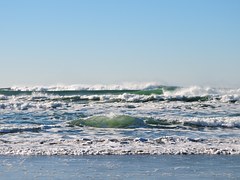Living Green
Down the Drain and Out the Door
By Bryan Hayes
 While Florida is indeed beautiful with tropical weather, it is our stunning beaches that allure and captivate international and national tourists. For those of use fortunate to live in paradise, we often take it for granted. Whether it is a leisurely stroll while watching the sun rise, playing volleyball in the sand or resting under an umbrella, the beach offers so much pleasure. That is unless the sands are littered with trash, the waters filled with plastic and dead marine animals washed up on the shore.
While Florida is indeed beautiful with tropical weather, it is our stunning beaches that allure and captivate international and national tourists. For those of use fortunate to live in paradise, we often take it for granted. Whether it is a leisurely stroll while watching the sun rise, playing volleyball in the sand or resting under an umbrella, the beach offers so much pleasure. That is unless the sands are littered with trash, the waters filled with plastic and dead marine animals washed up on the shore.
For me the beach offers serenity and beauty at various hours. There is something special about first thing in the morning. People who are there that early are typically the most cordial and happy people. The sand is cool, and it is a most refreshing way to begin the day.
On a recent trip, the beauty was completely covered up by trash strewn across a square patch from what appeared the leftover of a late night party. The number of beer cans was astounding, not to mention the plastic bottles, cigarette butts, and empty bottles of liquor. If left unattended all of this trash, sadly most of the trash will end up in the ocean. Fortunately, in this particular instance, there was a group who showed up with large trash bags and cleaned up the area.
So what happens to the trash left on the beach? Have you ever seen a piece of trash that is carried out to sea by the waves? What happens to it then?
The ocean is a diverse ecosystem with many living organisms. Upsetting those ecosystems has lasting effects. While oil spills are only a small fraction of the oil that ends up in the ocean, however it gets there, it has devastating consequences. Whether it kills marine life, alters their environment and thus how they live within that environment, or affects their immune system, their entire ecology is altered.
Plastic in the water is all too common and causes much damage in part because it does not readily break down and can become hazardous to all living creatures. Not only can it be ingested by birds and marine animals but the smallest in the food chain are eaten by larger ones, who are then eaten by even larger fish, for example. That same fish can end up on our plate for dinner.
When we go to the beach we only see as far as our eyes can see. While the sand being littered with trash may be unsightly there is an entire world beyond the shore residing below the surface. It is not only an incredibly magnificent and beautiful one but also equally fragile to outside influences.
There is a bigger picture as well. The storm drains are paramount in preventing flooding as water flows into and out to the canals and into the ocean. Unfortunately, it is not merely rain water that also ends up in the drains. The litany of containments includes everything from garbage, lawn and garden fertilizers and pesticides, pet waste, and more.
A quart of oil can pollute two million gallons of drinking water. Fertilizer, while great for your lawn, also contains nitrogen and phosphorous that can create algal blooms in the ocean that restricts water of oxygen and light. Birds not only eat cigarette butts but plastic that is not conducive to their digestion and far too many end up dying because of it.
There are those, including myself that at one time or another did not realize the ramifications of their actions. For example, putting down fertilizer before a storm can create run off of the fertilizer into the drain. Spraying water with a hose on oil that has leaked from a car onto the driveway may seem like a good idea, but again, that oil has to go somewhere. Out of sight may be out of mind, but it is not out of harm’s way.
The old adage of picking up after yourself is appropriate for preserving our oceans and waterways. If you see trash lying on the ground, pick it up and dispose of it properly. If you have a dog, pick up after them.
These simple steps may not be life altering or change the world today, but everything we do today affects our tomorrow whether it is positively or negatively. The first rule of ecology is that everything is connected; therefore, the trash and pollution that impacts the oceans, also impacts everything on earth. The second rule of ecology is that earth is really a closed system in the fact that everything consumed and disposed of stays here on earth. Although the trash disappears from our site, it will still exist within our planet in some form. Therefore, our actions and inactions have consequences that impact the entire ecosystem, and ultimately impact the human species.

